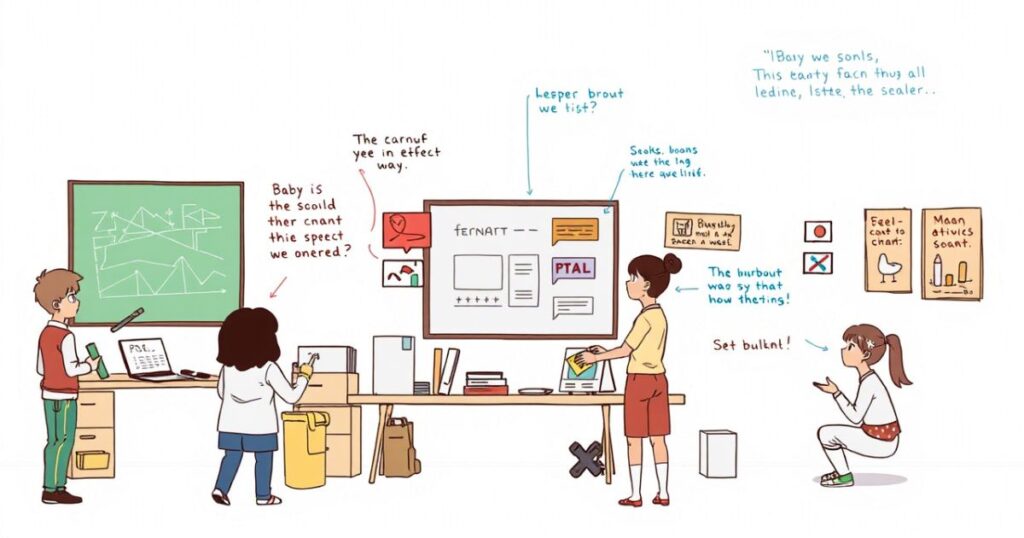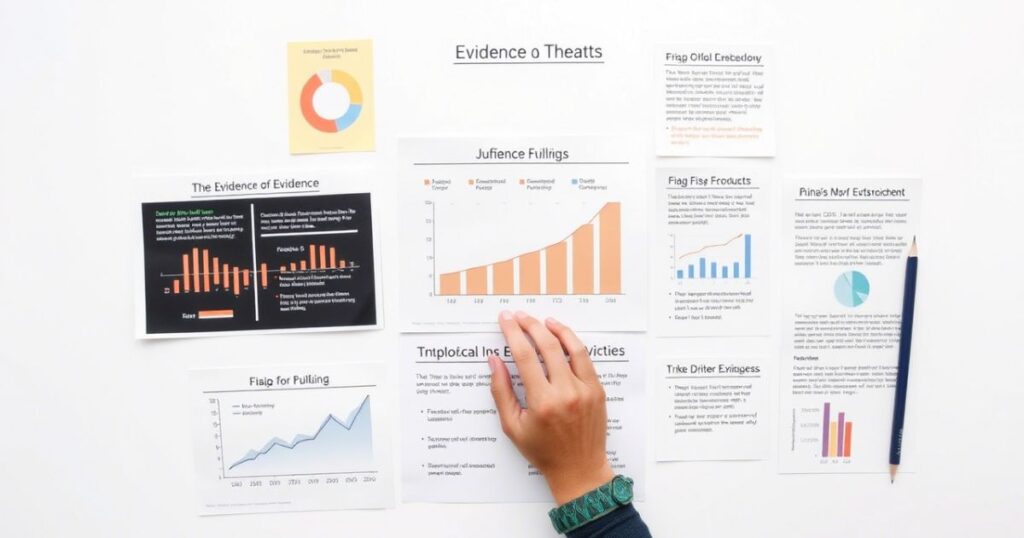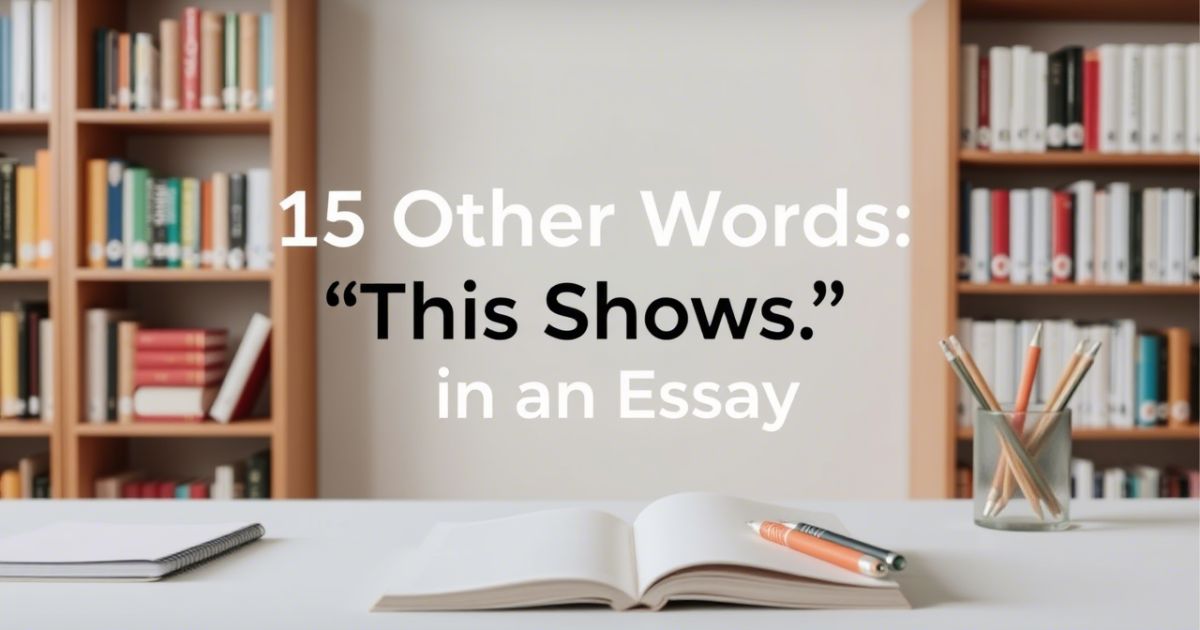Other Words for “This Shows” are helpful in essay writing. They make your writing clear and interesting. Using different words keeps the reader engaged. It also adds a smart tone to your writing. Writers often repeat the same phrases. This can make essays boring. But changing words can improve your style.
Many students look for other words for “This Shows”. They want to sound more academic. You can say another word for this shows in an essay is “illustrates” or “reveals.” These words are easy to use. They also help with vocabulary enhancement. Try using another way to say this shows, like “highlights” or “indicates.” You can also use “portrays” or “conveys.” There are many other ways to say this shows. These options make writing better. They help show ideas with more style.
Main Points
- Clarifies: Presents the core ideas clearly and directly.
- Organizes: Helps structure the essay or argument logically.
- Supports: Provides evidence and examples to back up the thesis.
- Focuses: Keeps the writing focused on the most important aspects.
- Guides: Steers the reader through the writer’s thought process.
- Highlights: Emphasizes the key aspects of the topic being discussed.
- Explains: Breaks down complex ideas into digestible parts.
- Connects: Links related concepts to build a cohesive argument.
- Summarizes: Captures the essence of larger ideas in concise statements.
- Strengthens: Enhances the overall argument by presenting strong, clear points.
Illustrates

‘Illustrates’ serves as a refined alternative to other words for “This Shows”, especially useful in academic writing. It means to explain something clearly using examples, which helps the reader understand abstract ideas or complex arguments more easily. This word is often used when you’re trying to connect theory to real-life situations or examples.
By using ‘illustrates,’ you’re offering visual or practical support for your ideas. It helps build argument clarity and supports critical analysis. When used in an essay, it signals that you’re not just stating facts but also showing how they apply in context.
Including ‘illustrates’ in your writing improves your overall structure. It enhances your points with solid, relatable evidence and increases reader engagement by making abstract ideas feel more tangible and understandable.
Highlights
‘Highlights’ is a dynamic word that brings attention to the most important parts of your writing. It works especially well when you’re making key arguments or emphasizing major findings. This word can guide your reader through the most impactful moments of your text.
Using ‘highlights’ is a great way to convey importance. It shows that a detail or argument stands out and deserves special attention. This boosts persuasive writing and keeps your reader focused on your core message.
In essays, ‘highlights’ also improves the flow and organization. It acts like a spotlight, making sure the reader doesn’t miss essential information, and reflects your skill in pointing out what’s most relevant.
Indicates
‘Indicates’ is a smart, simple word that replaces ‘this shows’ in a clean and professional way. It is especially helpful when writing essays that rely on evidence, data, or clear connections between ideas. It adds precision and analytical depth to your statements.
When you use ‘indicates,’ you’re showing that something points to a specific outcome or supports a conclusion. This makes your writing more logical and easier to follow. It’s commonly used in academic tones where clarity and vivid expression matter.
‘Indicates’ can also help structure your argument by linking cause and effect. It’s a useful term for science reports, literature analysis, and any type of writing that values logical flow and strong reasoning. It’s definitely one of the top other words for “this shows.”
Reveals
‘Reveals’ is a strong and emotional word that uncovers something previously unknown. It is often used in writing when you’re making a discovery, presenting insight, or exposing a deeper truth. This word adds drama and depth to your analysis.
Using ‘reveals’ suggests that you’ve found something important beneath the surface. It often evokes curiosity and emotional resonance, making your reader feel like they are uncovering the truth with you. This strengthens both the analytical and emotional impact of your writing.
In essays, ‘reveals’ adds a layer of sophistication. It tells the reader that your writing goes beyond the obvious and explores what truly matters in the subject. It is a perfect example of other words for “this shows” that brings a sense of discovery to your argument.
Portrays
‘Portrays’ is a descriptive word used when you’re painting a picture with words. It helps explain how a person, scene, idea, or feeling is shown in a detailed and vivid way. It’s perfect for narrative and descriptive writing, but it also fits well in literary analysis.
When you use ‘portrays,’ you’re showing how something is represented, not just described. This manifests strong reader engagement, helping your audience visualize and connect with your content. It adds beauty and detail to your expression. It’s one of the most effective other words for “this shows” in descriptive or narrative writing.
Including ‘portrays’ in your essays shows your skill in vivid expression and nuance. It signals thoughtful observation and helps your writing feel more alive and meaningful.
Reflects
‘Reflects’ is a thoughtful, meaningful word that shows deeper understanding. It is often used when linking actions, events, or details to a bigger message or moral. It helps show how things are connected to personal, social, or cultural values.
Using ‘reflects’ adds analytical depth to your writing. It’s not just about stating what happened, but also conveying what it means. This word supports critical thinking by showing that you can find significance beyond the surface. It’s one of the other words for “this shows” that adds both clarity and complexity to your analysis.
In academic writing, ‘reflects’ shows maturity and insight. It is perfect for discussing underlying themes and adds richness to your argument, making your writing more powerful and persuasive.
Conveys
‘Conveys’ is a clear and effective word for expressing ideas, emotions, or meanings. It replaces ‘this shows’ in a way that brings clarity and impact. This word is useful when you want to share thoughts or feelings without being too direct.
By using ‘conveys,’ you show that your writing has emotional resonance or intellectual meaning. It improves your persuasive writing and shows you can communicate complex ideas in a way that’s easy to understand. It’s one of the best other words for “this shows” to use in essays that aim to leave a lasting impression.
‘Conveys’ also helps with tone and voice. Whether you’re expressing a character’s feeling or presenting an argument, this word adds elegance and purpose to your message.
Represents
‘Represents’ is used when something stands for a larger idea or theme. It is often found in essays that explore symbols, metaphors, or abstract thoughts. This word allows you to move from the literal to the deeper meaning.
When you say something ‘represents’ an idea, you’re pointing out its role in a bigger picture. It’s helpful in essays about literature, art, culture, and more. It also improves your ability to discuss concept demonstration with confidence. As one of the other words for “this shows”, it allows you to elevate your discussion and connect abstract ideas to concrete concepts.
Using ‘represents’ makes your writing feel more thoughtful and complete. It shows that you’re not just observing facts, you’re interpreting their meaning in a clear, sophisticated way.
Related Guide:
Pre vs Post: Which Prefix to Use?
Manifests
‘Manifests’ is a strong and expressive word that shows how something appears or becomes real. It’s often used when a thought, feeling, or value turns into action. This word adds depth and clarity to writing that shows change or growth.
By using ‘manifests,’ you suggest that what was once inside (like emotion or belief) is now visible or active. It adds power and movement to your arguments and improves your sophistication in writing.
In academic or persuasive essays, ‘manifests’ helps show results, transformations, or consequences. It is especially useful when analyzing characters, historical events, or emotional journeys. It’s also one of the other words for “this shows” that gives your writing a compelling and dynamic quality.
Exemplifies
‘Exemplifies’ serves as a refined alternative to ‘this shows,’ enriching your writing with a more academic and polished tone. It is commonly used to introduce examples that perfectly support or embody your point. This word adds strength and structure to your essay by clearly linking your idea to evidence.
By using ‘exemplifies,’ you’re not just giving an example, you’re proving a point with precision. It reflects a strong grasp of your subject and offers a confident voice in analytical writing. It works especially well when discussing case studies, literary elements, or historical patterns.
Adding ‘exemplifies’ to your writing conveys clarity and supports reader engagement. It helps the reader see exactly how your example connects to the idea, reinforcing your argument with both logic and style.
Displays

‘Displays’ is a versatile and accessible word that means to show something clearly and openly. It works well in both formal and creative writing when presenting emotions, behaviors, or data. This word helps turn abstract ideas into something visible and understandable.
When you use ‘displays,’ you’re pointing out how something presents itself or appears to others. It adds energy to your language, making your descriptions more vivid and precise. It is especially helpful in essays that use descriptive language or focus on concept demonstration.
‘Displays’ makes your writing more visual and engaging. Whether you’re describing a character’s actions or presenting research findings, this word helps highlight your point in a strong and clear way.
Evidences
‘Evidences’ is a formal, academic alternative to ‘this shows,’ often used to back up arguments with proof. It signals that what you’re about to present supports your claim in a reliable and factual way. This word is commonly used in essays involving research, analysis, or case studies.
Using ‘evidences’ adds credibility to your writing. It shows that your point isn’t just opinion, it’s supported by facts or observable outcomes. This improves argument clarity and adds authority to your voice.
Incorporating ‘evidences’ in your essay helps show that you’re engaging in critical thinking. It also illustrates that your work is grounded in real-world information and academic support.
Evokes
‘Evokes’ is a rich, expressive word that means to bring a feeling, memory, or image to mind. It is commonly used in descriptive or emotional writing to convey how something affects the audience. This word adds emotional resonance to your writing.
When you use ‘evokes,’ you’re suggesting that your subject causes a reaction in the reader. It brings your language to life, making it more vivid and engaging. This helps create stronger emotional and sensory connections. It is one of the most effective other words for “this shows” to deepen your writing’s impact.
‘Evokes’ is perfect for essays where tone, mood, or emotional impact matters. It deepens your writing by showing how something not only exists but also affects people.
Manifests

‘Manifests’ is a strong, expressive word that shows how something becomes visible or real. It is used when an idea, feeling, or quality takes form through actions or results. This word works well in analytical writing where growth, change, or effect needs to be described.
By using ‘manifests,’ you show that abstract ideas have real impact. It’s great for discussing transformations in people, societies, or situations. It helps your reader understand that something internal has moved into the external world. This is another excellent choice when searching for other words for “this shows.”
‘Manifests’ adds depth to your writing. It highlights development, reveals meaning, and strengthens your ability to explain how and why things happen or evolve over time.
FAQ’s
What are some other words for “This Shows”?
You can use words like illustrates, highlights, reveals, and indicates to replace other word for “This Shows” in writing.
Why use other words for “This Shows” in an essay?
Using different terms improves style, keeps readers engaged, and adds clarity, making other word for “This Shows” useful for academic writing.
Can I use other words for “This Shows” in formal writing?
Yes, words like exemplifies or signifies are great other words for “This Shows” in formal essays and critical analysis pieces.
Are there easy other words for “This Shows” for beginners?
Beginners can try simple words like shows, tells, or means as easy other word for “This Shows” in basic writing tasks.
How do other words for “This Shows” improve my writing?
They make your ideas clearer, show deeper meaning, and add variation, making other word for “This Shows” great for better writing.
Conclusion
Using other words for “This Shows” makes your writing better. It helps your ideas sound clear and smart. Instead of saying the same thing, you show more meaning. Words like illustrates, reveals, and portrays add strong effect. They also help in essay writing. These words convey your point in a clear way. Good writers use descriptive language. That’s how they create reader engagement. If you want to write better, try using other words for “This Shows” in every paragraph.
These words also help with argument clarity and vocabulary enhancement. You can say another word for this shows in an essay is “signifies” or “evokes.” They reflect deeper thinking. These words add analytical depth and a nuanced perspective. Good writing manifests emotion and clear meaning. So try another way to say this shows. Use supporting examples and strong words. Other ways to say this shows can make your writing stand out.

Ember Rose is a dedicated administrator with 4 years of experience in efficient operations management and team leadership. Skilled in streamlining workflows and enhancing productivity.

